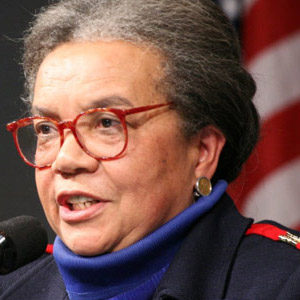CINCINNATI – The middle school years represent a critical time in the development of black males, the period where most young boys show “a precipitous drop” in their personal and academic achievement, a panel of leading educators and academics said today at a conference on child welfare held in Cincinnati.
Only one out every eight African-American boys in the fourth grade is proficient in reading, compared to more than three out of every eight fourth graders who are white, according to the U.S. Department of Education’s National Assessment of Educational Progress in 2011. By the time African-American boys reach the eighth grade, their rates of reading proficiency have fallen even further, with 11 percent reading at grade level.
 It’s a problem with complex and tangled roots, nurtured by the historical inequalities created by slavery, the lack of older male role models, and low social expectations, panelists said. But, they stressed, it can be solved.
It’s a problem with complex and tangled roots, nurtured by the historical inequalities created by slavery, the lack of older male role models, and low social expectations, panelists said. But, they stressed, it can be solved.
“Little black boys can do everything other little boys can do,” said Marian Wright Edelman, founder of the Children’s Defense Fund, which organized the four-day conference. She reeled off a list of “little black boys” who grew up to become national leaders.
“Frederick Douglas was a little black boy,” Wright said. “Barack Obama was a little black boy.
Nationally, less than 2 percent of public school teachers are black men, said Rev. Dr. Robert Michael Franklin, the president of the historically black Morehouse College in Atlanta. Studies show that just having an older black male show up in an inner-city classroom made both the boys and the girls perform better in an effort to impress him, Franklin said
Recruiting more black male teachers is one answer to raising the achievement levels of black male students, panelists agreed. Another is to segregate classroom by sex. Single-sex classrooms help boys focus on their academic work “without the distraction of girls,” Franklin said. However, he said, “It’s not a formula. It doesn’t work for everybody.”
More than anything, black boys need the same kind of mental and social support that all kids need, but they rarely get it, said Geoffrey Canada, who heads the nonprofit Harlem Children’s Zone. When there’s a shooting at a suburban school, for example, the school often announces it will bring in counselors for the entire student body, Canada said.
“I don’t ever see anyone talking about sending a counselor in an inner-city school after there’s been a shooting.” Canada said. “There’s this assumption that this is normal.”
The trauma created by living in a combat zone has mental and social consequences, Canada said. He added that even soldiers who spend a year away at war are provided with counseling, and inner city kids are in combat zones for years.
“We really just have to stop treating these kids as if they are anything else other than kids,” Canada said. “When you take these young people, and isolate them, and punish them, and they get no chance of redemption, they say, ‘Well, everybody else is giving up on me, so I may as well give up on myself.’
“All of us have done bad things,” Canada said. “Who forgives you and allows you to become honest again?”
Photo from Justice and Drugs Blog.

























